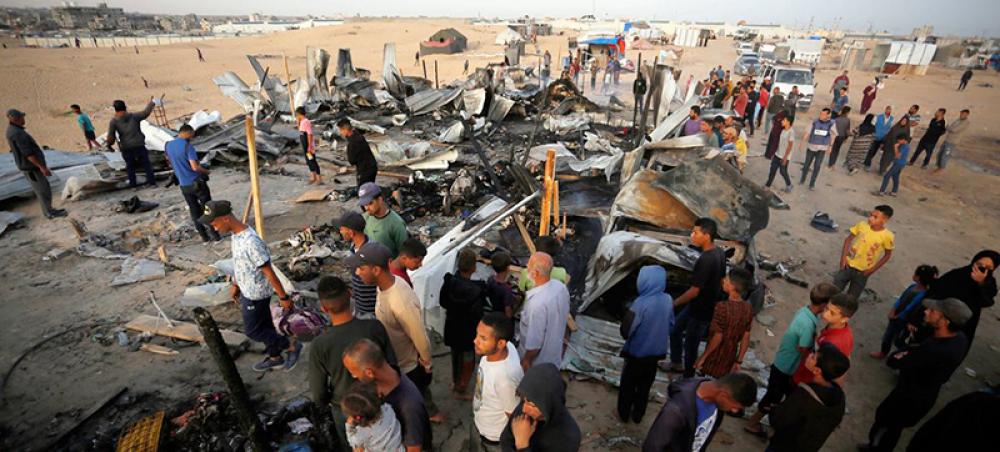Just Earth News | @justearthnews | 16 Aug 2024

Photo Caption: Gazans gather at a camp for displaced people which was bombed in May 2024. (file) Photo courtesy: UNRWA
As the number of Palestinians killed in Gaza passes the dark milestone of 40,000, UN rights chief Volker Türk called on Thursday for an end to the killing “once and for all” and the release of all hostages while negotiators prepared to meet in Qatar to renew efforts to halt the conflict and avert a wider war.
“Most of the dead are women and children. This unimaginable situation is overwhelmingly due to recurring failures by the Israeli Defense Forces to comply with the rules of war,” the High Commissioner for Human Rights said in a statement.
“On average, about 130 people have been killed every day in Gaza over the past 10 months,” Mr. Türk continued, citing estimates based on data from the enclave’s health authorities, before describing the “scale of the Israeli military’s destruction of homes, hospitals, schools and places of worship [as] deeply shocking.”
He noted that his Office had documented serious violations of international humanitarian law by the Israeli military and Palestinian armed groups, including Hamas fighters responsible for the 7 October terror attacks on multiple locations in southern Israel that left some 1,200 dead and more than 250 taken hostage.
Meanwhile in Gaza, a fortunate few in the devastated enclave enjoyed a little respite from the ongoing conflict, at a restored water pumping station in Khan Younis.
Tweet URL
“The last time I visited this well was at the end of April, and it was destroyed, surrounded by shrapnel and potential unexploded ordinance,” said Louise Wateridge, spokesperson for UNRWA, the UN agency for Palestine refugees, which led repairs at the facility.
“I saw so many children not only collecting drinking water for their families, but also enjoying cooling off and playing under the water, spilling over from filling the larger tanks…a basic joy that is available to so few here.”
The severe shortage of clean water throughout Gaza since the war began has compounded families’ efforts to stave off disease and malnutrition, highlighting the importance of the reopened facility in the southern city and beyond to tens of thousands of people.
It is the largest drinking water supply to families in Khan Younis and operates for eight hours a day, “pumping over 500 cubic metres of clean drinking water on a daily basis to around 100,000 displaced people,” Ms. Wateridge said in an online video post that showed children and adults filling up jerrycans and other youngsters playing happily under a leaky hose.
“There are so few water sources across the Gaza Strip that many families are forced to travel huge distances in sweltering temperatures,” she explained. “Others are not able to access [clean water] at all, forcing them to survive on dirty water.”
No let-up in bombing
Despite the “relentless” bombing, the UNRWA official noted that in addition to those arriving at the water station in person, tankers were being filled continuously to serve those unable to go there themselves.
As humanitarians welcomed the development, media reports indicated that new evacuation orders had been issued by the Israeli military, impacting Al-Qarara and Al-Sathar in and around Khan Younis.
On Tuesday, communities in Makhta and Beni Suhaila in eastern Khan Younis received orders to move to the so-called “safe zone”. According to the UN aid coordination office, OCHA, the order impacted essential services, including eight water and sanitation facilities, along with two primary healthcare centres.